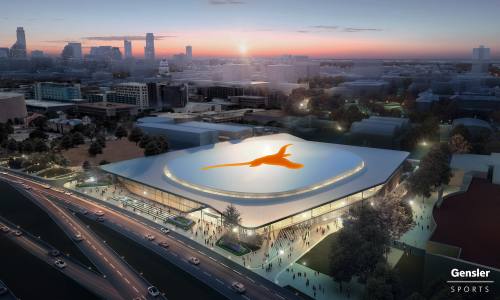The project to straighten out Red River Street through the east end of The University of Texas campus to accommodate the school’s new basketball and special events arena received final authorization from Austin City Council last week amid concerns from some council members over how the university would repay the city for its accommodation.
The Sept. 19 vote came roughly seven months after City Council—following some disagreement—
authorized and set the parameters for a deal with the university’s board of regents over what the city expected in return for greenlighting the realignment. Leading up to the vote, some City Council members said they still remained unsure about how the city would be repaid for extending itself for the acceleration of a UT project.
“While we did not have complete agreement [in February] about what those benefits were, I think there was pretty clear agreement that we wanted to secure those benefits,” District 10 Council Member Alison Alter said. “While I support moving forward with the stadium and the alignment, we still have a fiscal responsibility to our community to make sure we are capturing those community benefits. We do not have an obligation to underwrite this [arena].”
The mayor and council members all agreed a new arena benefits the city just as it does the university. They also agreed that having UT pay for the realignment of Red River so it runs in a straight line between East Cesar Chavez to East Dean Keaton streets rather than skirting around campus—a project already highlighted as a priority for the city to increase connectivity—would benefit the city.
Still, the city felt there was more to leverage financially out of giving the university a valuable piece of land, expediting the arena project and waiving certain fees related to the Red River project. UT will pay for the project according to the agreement, but the city has the option to provide some financial assistance and get credited for its efforts.
History almost repeats itself
What to leverage was a point of disagreement among council members back in February. Staff originally proposed the university credit any financial assistance on the realignment project from the city back to the city for “the possible purchase of the Lion’s Municipal Golf Course or to other agreed-upon projects.” Although Alter, Mayor Steve Adler and four other council members supported explicitly highlighting the golf course, other council members disagreed with what they considered a soft earmark for the potential funds.
The Lion’s Municipal Golf Course, colloquially known as Muny, is a nationally historic course owned by UT that the city has leased and operated for decades. Known to be one of the first desegregated courses in the South, Muny has been used as a bargaining chip since at least the 1970s, when the university first threatened to cancel the city’s lease and sell the valuable 141 acres of West Austin land to finance a university expansion.
The city was able to preserve Muny back then by agreeing to pay for the realignment of Red River between 19th and 38th streets so the university could build the Frank Erwin Center. This time around, City Council agreed in February to not name any specific project. Rather, they wanted to the city manager to seek out projects that might benefit from a city-university partnership.
However, what the city might get from the university, beyond a straightened Red River and a new special events arena, remains to be seen, as nothing was explicitly named in the executed agreement between the two parties, which was made public only hours before City Council voted on the final approval of Red River’s realignment Sept. 19.
Although several council members said they were comfortable with moving forward, Alter attempted to postpone the vote. She cited frustration with the limited time she had to review the already executed agreement and, later in the meeting, the lack of community benefit she felt the city was getting in the deal. She said the city could have amended the agreement with the university if they had more time.
Richard Suttle, an attorney with Armbrust & Brown representing UT on the project, speculated Alter was trying to link Red River and the arena project back to Muny, but he said they needed to be treated as completely different topics.
“I’m not convinced that our negotiations have led to sufficient benefit to the community,” Alter said prior to abstaining on the vote. “Based on a limited amount of time I had to review this item, I continue to have questions and apprehensions about the value we’re giving up and the value we’re receiving in return. As a community, we simply cannot give up our leverage time and time again in negotiations.”
Council Member Natasha Harper-Madison, whose District 1 surrounds part of Red River, said she was very excited about the enhanced connectivity and improvements along the street that would improve the use for pedestrians and cyclists.
According to the agreement, the university must complete the new Red River before the city grants the land occupied by the current Red River. The realignment’s completion deadline is set for Feb. 15, 2022.





